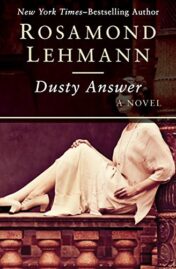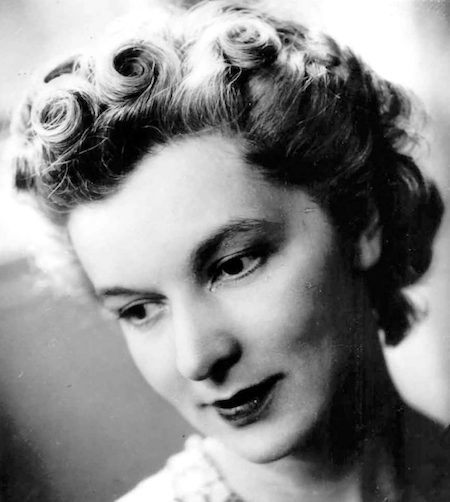Dusty Answer by Rosamond Lehmann (1927)
By Francis Booth | On August 13, 2023 | Updated December 20, 2023 | Comments (0)

The Well of Loneliness (1928) by Radclyffe Hall is often cited as the first published lesbian novel written in English, but Dusty Answer by Rosamond Lehmann (1927) preceded it by a year.
As in Hall’s novel there is no explicit lesbianism but a strongly implied relationship between two girls at college. This was noted by outraged critics of the time, one of whom wrote an article in the London Evening Standard titled “The Perils of Youth,” addressing what he presumed to be the degenerate readers of Lehman’s novel:
“To all these sex-ridden young men and women I would counsel, as the best remedy for their troubles, silence and self-control. And I would have them remember that all their discussions will never carry them back beyond the plain unvarnished statement of Genesis, ‘Male and female created He them.’”
This synopsis of Dusty Answer by Rosamond Lehmann is excerpted from Girls in Bloom: Coming of Age in the Mid 20th-Century Woman’s Novel by Francis Booth, reprinted by permission.
A bittersweet novel of manners
It’s hard to imagine now why critics were so incensed by Dusty Answer. It is a very gentle, bittersweet novel of the manners of the upper-middle-class England of its time, as well as being a bildungsroman following Judith’s progress through adolescence.
Like her author, Judith, the heroine of Dusty Answer, has been brought up in privilege and privately educated. The first part of the book is a reminiscence of her childhood and her relationship with the cousins who lived next door to her family.
By the end of the book she will have had sex – albeit, as it were, offstage – with one of the boys and offered herself – albeit half-heartedly – to the other two. But her main passion is a young woman she meets when she goes to college.
For the first time in her life she is meeting people outside her immediate circle and has a room of her own at last. She is on the way to her coming of age, though she finds that the price of freedom is a separation from the certainties of childhood:
“She sat on a hard chair and said to herself: Independence at last. This is Life. Life at last is beginning; but rather because it seemed so much more like a painful death than because she believed it.”
Judith is at first out of her depth and lonely in this unfamiliar environment; one of her colleagues asks her if there is anyone she knows from her school. “I’ve never been to school. This is the first time I’ve ever been away from home,” she says.
. . . . . . . . . .

Girls in Bloom is available on Amazon US and Amazon UK
Girls in Bloom in full on Issuu
. . . . . . . . . .
Meeting and becoming obsessed with Jennifer
But then she meets Jennifer who, as it turns out, will be the love of her life, even though she loses her in the end. There is never any description of the physical relationship between the two women, though it is strongly implied.
At first she does not know the true nature of her feelings, does not dare to confide in Jennifer. Ironically, they first become close over her feelings for Roddy, one of her former neighbors, whom, pre- and post-Jennifer she also thinks is the love of her life and with whom she will make love; her first and only time with a man in the book.
Judith becomes obsessed with Jennifer. “Always Jennifer. It was impossible to drink up enough of her; and a day without her was a day with the light gone.”
Lehmann’s detached authorial voice occasionally shifts into second person to get us closer to Judith: “Was it that people had the day and the night in them, mixed in varying quantities? Jennifer had the strength of day, and you the strength of night. By day, your little glow was merged in her radiance; but the night was stronger, and overcame her.”
The two girls spend as much time as possible together, going swimming together naked; Judith admires Jennifer as if she were a Greek statue. They read and study together, talking with “excitement, with anxiety, as if tomorrow might part them and leave them for ever burdened with the weight of all they had had to tell each other.”
Jennifer becomes “the part of you which you never had been able to untie and set free, the part that wanted to dance and run and sing, taking strong drafts of wind and sunlight … And yet was checked by a voice that said doubtfully that there were dark ideas behind it all, tangling the web; and turned you inward to grope among the roots of thought and feeling for the threads.”
Of course. this intensity can’t last, and it doesn’t. By the third year, “Jennifer was no longer the same. Somewhere she had turned aside without a word, and set her face to a new road. She did not want to be followed. She had given Judith the slip, in the dark.”
It turns out that there is another woman in Jennifer’s life: the older, more sophisticated and very butch Geraldine, “so mature and well-dressed; if there was to be a fight, what chance was there for a thin young student in a woolen jumper?” Judith has lost Jennifer but has become almost reconciled; “how ridiculous, how sad to have made one person into all poetry!”
After Jennifer, “there was nothing in life save work,’ as Judith prepares for her exams. “Three hours. It was over. You could not remember what you have written; but you had never felt more firm and sure of mind. Three hours nearer to life.”
Leaving college life; reconnecting with Roddy
But leaving college these is a great hole in this life, “a great idleness under whose burden you felt lost and oppressed.”
Judith thinks only of the “single tremendous calamitous significance of Jennifer, how since her going it had been like the muddy bed of the lake whose waters had been sapped day after day in a long drought.”
As she leaves the college building for the last time, she leaves behind no real friends: her absorption in Jennifer has prevented her from coming close to anyone else.
Judith returns home and immediately goes off with her society mother – there is no father – to the south of France, traveling around with her, staying in good hotels, dressing elegantly and socializing with equally shallow socialites. But then she meets Roddy again.
It seems as though Roddy has taken Judith’s virginity – or she has given it to him – under the willow trees; it is only implied here but she confirms it later on. Roddy does not love her and does not even want to see her after the incident but still she does not regret it.
This is undoubtedly a coming of age moment for her, though not the final one. On the rebound, and only to hurt Roddy, she agrees to marry Martin, another of her childhood neighbors; he is very sweet and charming to her and loves her completely but she cannot really see him as anything other than a childhood friend.
Judith quickly relents and tells Martin she cannot marry him; he is devastated and subsequently dies in a boating accident – it is not clear whether or not he has killed himself. Judith continues to travel with her mother and live a shallow life in her mother’s shallow international society.
. . . . . . . . . .

Rosamond Lehmann
. . . . . . . . . .
Enter Julian; coming of age
While traveling, she meets Julian, the third of the cousins who used to live next door to her; he is now a world-weary, experienced and cynical playboy who offers to make her his mistress, though he makes it clear he is not interested in marriage.
“Julian must save her this time: surely his wit and wisdom, surely the unknown world of sexual, emotional and intellectual experience which he held so temptingly, just out of reach – surely these would, in time, heap an abiding mound upon the past.”
But following the news of Roddy’s death, before she has chance to sleep with him, she changes her mind, implying to him that she is still a virgin.
“Julian – I couldn’t give you – what you wanted. I couldn’t! It’s such a step – you don’t realise – for a woman. She can’t ever go back – afterwards, and be safe in the world. And she might want to.”
She does let him kiss her, however and thinks: “Now I’ve been kissed by all three of them.” Julian later writes Judith a very long letter asking if they can still be friends.
“What a year this has been, and how we grow up!” she answers him. “I am all uprooted, and don’t know what I shall do. I must begin to make plans. I suppose I shall never emerge from obscurity in any way. I used to think it a certainty that I should … Enchantment has vanished from the world. Perhaps it will never come back, save in memory. Perhaps I shared with you the last gleam I shall have of it.”
Jennifer also writes to her; she is still with Geraldine and has cut her hair short in sympathy with her and as a sign of her sexuality.
Jennifer agrees to meet Judith at the cafe in Cambridge that they used to go to together; Judith goes but Jennifer does not show up. Judith goes home, perhaps for the last time, finally come of age.
She was rid at last of the weakness, the futile obsession of dependence on other people. She had nobody now except herself, and that was best.
This was to be happy – this emptiness, this light coloured state, this no-thought and no-feeling.
She was a person who is so past made one great circle, completed now and ready to be discarded.
Soon she must begin to think: What next?
But not quite yet.
More about Dusty Answer by Rosamond Lehmann
- Reader discussion on Goodreads
- 1927 review in The Atlantic
- Review on Heavenali
- Rosamond Lehmann, Literary Star (Paris Reviews)
. . . . . . . . . .
Contributed by Francis Booth, the author of several books on twentieth-century culture:
Amongst Those Left: The British Experimental Novel 1940-1960 (published by Dalkey Archive); Everybody I Can Think of Ever: Meetings That Made the Avant-Garde; Girls in Bloom: Coming of Age in the Mid-Twentieth Century Woman’s Novel; Text Acts: Twentieth-Century Literary Eroticism; and Comrades in Art: Revolutionary Art in America 1926-1938; High Collars & Monocles: 1920s Novels by British Female Couples.
Francis has also published several novels: The Code 17 series, set in the Swinging London of the 1960s and featuring aristocratic spy Lady Laura Summers; Young adult fantasy series The Watchers; and Young Adult fantasy novel Mirror Mirror. Francis lives on the South Coast of England.
Leave a Reply